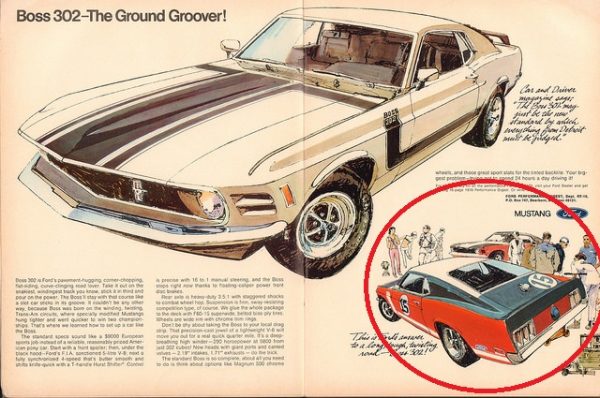Even your local car dealer is taking note: cars for dudes aren’t just for dudes anymore. For decades, we’ve been inundated with the image of the man behind the wheel of the muscle car, burning rubber as he drifts carelessly round the bend in pursuit of power. The men drive the sexy cars to get the sexy women, right?
This gendered and sexist way of looking at cars is slowly yielding to the reality. For example, check out this blog post on how Ford’s muscle car isn’t just for men. Was it ever just for men? The title of the post (“Ford’s Muscle Car Not Just for the Men”) betrays the way we’ve been conditioned to think sports cars are part of the Boys’ Club. The Ford Mustang is America’s quintessential sports car, a supposed symbol of all-things-male. Just look at this ad for the 1970 Mustang Boss 302:

In the right-hand corner, a woman with a trophy next to her swoons over a man in racing gear. Besides one other woman who is apparently adjusting her shoe, the image is populated with men, and the message is clear: win the race with a Mustang, and you get the trophy and the girl. She’s literally a trophy-woman.
Yet now, Ford’s sales analyst Erich Merkle says, “Women like [the Ford Mustang] because it is a practical choice. It looks great, and it provides good performance and fuel efficiency.”
The Mustang isn’t a symbol of manliness. It’s a piece of machinery different people like, dislike, or feel indifferent about for their own reasons. Ford’s sales analyst is noting a trend. Women who buy the Mustang are interested in it because it’s an all-around good car. With that, they’re interested in something the modern Mustang has that the old Mustang didn’t have: fuel efficiency. This mirrors the rising demands of a new generation of car buyers.
Millennials and the New Vehicle
Past engineering efforts didn’t aim to maximize fuel efficiency in the Mustang. Something important has changed: Millennials have entered the market, and they’re prioritizing good fuel economy. Out of 75 million millennials, 76 percent are looking for an eco-friendly vehicle. Thus, the new four-cylinder EcoBoost Mustang.
Millennials want their vehicles to be fuel-efficient for multiple reasons:
- They’re strapped with student loan debt: 42 percent of millennials ages 18-29 either have to worry about debt themselves, or they know someone who does
- They have to take out a loan to buy the car: millennials earn an average of $35,592 per year, 20 percent less than baby boomers earned when they were they same age
- They care about climate change: in 2015, 55 percent believed “Global warming is a proven fact and is mostly caused by emissions from cars and industrial facilities…”
It makes sense for cars to be fuel-efficient when you don’t have a lot of money to spend on gas and you believe gas-guzzlers are contributing to climate change. With these considerations in mind, it seems foolish to think of what your car says about your gender. Millennials are interested in more pressing and practical issues. What is this car for? To get me from point A to point B, C, and D. How can I save money and help save the environment? By buying an eco-friendly car.
This isn’t to say that everything is perfect and non-gendered in the car world. You still see ads everyday that sell trucks to men and minivans to moms. That’s because of statistics that say more men drive trucks and more women drive minivans. And this comes down to perceptions of societal functions of men and women. Trucks are typically for work, for hauling stuff—which is viewed as men’s work—while minivans are for carting the family around—which is viewed as women’s work.
But as society and car culture continue to change, expect gendered ads for trucks and minivans to change, too. Increasingly, we’re all sharing all the jobs. In other words, expect car ads to be a lot less annoying down the line.
Featured Image: Lana Del Rey/Wikimedia Commons
